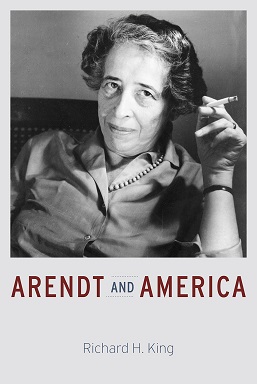An interview with Richard H. King on Arendt in America
Richard H. King’s Arendt and America considers a unique reception history—that of America on Hannah Arendt, and not the other way around. Situating Arendt within the context of US intellectual, political, and social history, King examines how time spent in her adopted homeland and the relationships she formed while living there allowed her the necessary time and space to develop some of her most compelling contributions to critical thought, including the idea of the modern republic as an alternative to totalitarian rule, and the concepts behind the “banality of evil.” Recently, Kind engaged in an hour-long interview with Lillian Calles Barger, for the New Books in Intellectual History series.
From that interview’s header:
Her interests were neither social nor cultural, but the political sphere. In Cold War America, she became part of a moral center of the New York intellectuals and forged relationships with people such David Reisman, Dwight MacDonald, Irving Howe, and Mary McCarthy. Arendt expressed a continual concern with the nature of political action, the possibility of new beginnings and the idea of the “banality of evil,” introduced in the controversial 1963 book Eichmann in Jerusalem. Difficult to categorize ideologically, Arendt sought a “worldly” politic, rather than politics based in idealism or pragmatism. Her thought influenced post-war thinking on political participation, civil disobedience, race, the Holocaust and the meaning of republicanism and liberalism. King has given us a portrait of a complex, and often ironic, relationship of a seminal thinker with America as a place and a set of ideas and institutions.
To read more about Arendt and America, click here.
